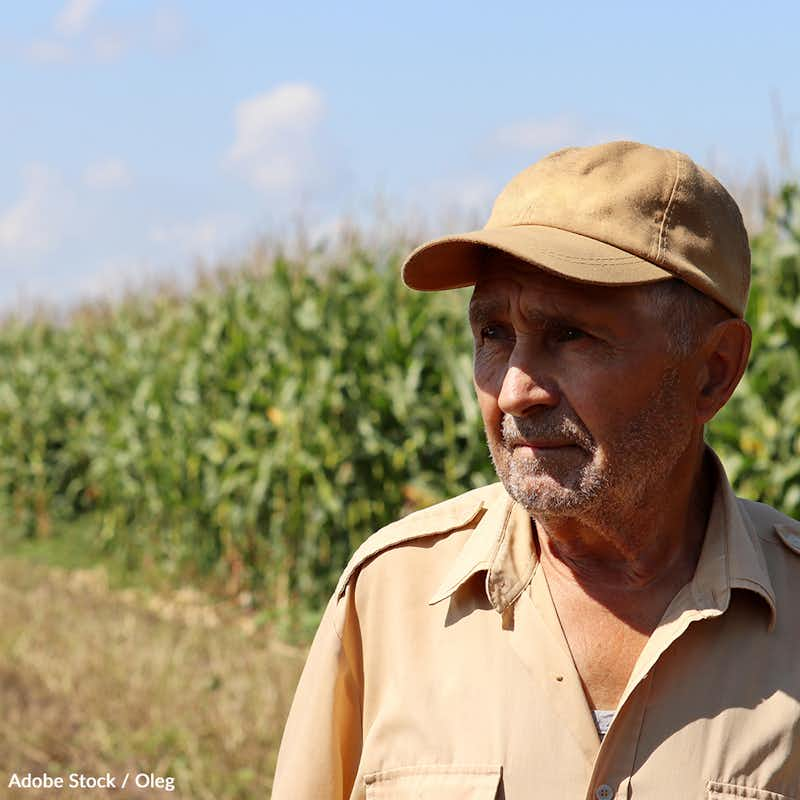Help Small-Scale Farmers Support Their Families
7,979 signatures toward our 30,000 Goal
Sponsor: The Hunger Site
Small-scale farmers are the backbone of our food system, yet they face significant challenges in today's economy. Take the pledge to help them thrive!

Small-scale farmers are the backbone of food production in many developing countries, yet they often lack access to education and resources that could help them improve their yields and livelihoods1. This lack of support can have devastating consequences, not just for the farmers themselves, but also for the communities and countries that depend on them for food2.
One of the major challenges small-scale farmers face is a lack of access to education and training on modern farming techniques. Many of these farmers have inherited their land and methods from their ancestors, and may not have the knowledge or resources to adopt new technologies or practices that could improve their yields. As a result, their farms are often less productive and less resilient to climate change and other challenges3.
This leaves farmers more likely to experience crop failures due to weather extremes such as droughts, floods, and storms. As well, loss of income and food security, compounded by the difficulty in making a living from farming4.
Another key issue small-scale farmers may face is a lack of access to financial resources, such as credit and loans5. Small-scale farmers often lack the collateral or credit history required to access traditional banking services, leaving them reliant on informal lenders who may charge exorbitant interest rates. This can trap farmers in a cycle of debt, making it difficult for them to invest in their farms or improve their livelihoods6.
In addition to these challenges, small-scale farmers also often struggle with inadequate infrastructure and services. They may lack access to markets, storage facilities, and transportation, which can make it difficult for them to sell their products or keep them fresh. This lack of infrastructure can also make it harder for small-scale farmers to access inputs, such as seeds and fertilizer7.
The lack of education and resources for small-scale farmers has serious consequences for food security and rural development. Small-scale farmers are often unable to produce enough food to feed their families, let alone sell surpluses at market. This can lead to chronic food insecurity and malnutrition, which in turn can exacerbate poverty and other social issues8.
There are also wider implications for the economy, since small-scale farming provides employment and income to millions of people in rural areas, and it also contributes to food security and food sovereignty9.
The lack of education and resources for small-scale farmers is a major challenge that must be addressed if we are to achieve sustainable food systems and reduce hunger and poverty. Supporting small-scale farmers through education, training, and access to resources such as credit and markets, is essential for achieving food security and rural development10.
Supporting the world's small-scale farmers can start at home. Take the pledge to help small-scale farmers thrive in today's economy!
- Food and Agriculture Organization of the United Nations (23 April 2021), "Small family farmers produce a third of the world’s food."
- The World Bank (25 February 2016), "A Year in the Lives of Smallholder Farmers."
- Journal of Agricultural Science (March 2014), "Constraints and Challenges Facing the Small Scale Farmers in Limpopo Province, South Africa."
- Alvaro Lario, World Economic Forum (4 November 2022), "Small-scale farmers feed the planet. They should not be overlooked in our fight against climate change."
- Eva-Marie Meemken, Proceedings of the National Academy of Sciences (13 December 2019), "Smallholder farmers and contract farming in developing countries."
- PennState Extension (27 May 2005), "Financing Small-Scale and Part-Time Farms."
- Marvin Ulrich Lantz, ResearchGate (July 2019), "Market Access Constraints as Barriers to Benefits from Growth and Trade : The Case of Small Scale Farmers in South Africa."
- TechnoServe (13 May 2022), "Why Can’t Farmers Always Feed Their Own Families?"
- Rachel Wynberg, Laura Pereira, The Conversation (30 August 2018), "Why developing countries should boost the ways of small-scale farming."
- Kelsey Nowakowski (12 October 2018), "Why we need small farms."
The Pledge:
I understand that Small-scale farmers are the backbone of food production in many developing countries, yet they often lack access to education and resources that could help them improve their yields and livelihoods.
As such, I pledge to
- Support small-scale farmers by buying from them directly. Many small-scale farmers sell their products at farmers' markets or through community-supported agriculture programs. I pledge to buy from them directly, to help them get a fair price for their products and build a sustainable income.
- Invest in small-scale farmers. I pledge to invest in small-scale farmers by supporting organizations that provide education and resources to farmers. Many organizations provide training and resources to small-scale farmers, helping them improve their yields and livelihoods.
- Advocating for policies that support small-scale farmers. I pledge to contact my representatives and ask them to support policies that would help small-scale farmers access education, resources, and markets.
- Reduce food waste. I pledge to reduce food waste by being mindful of what I buy and how much I consume. Food waste is a major problem in the United States, and reducing it can help small-scale farmers by increasing demand for their products.
- Educate yourself. I pledge to educate myself and others about the importance of small-scale farmers and the challenges they face. The more people know about these issues, the more likely they are to support small-scale farmers and advocate for policies that help them.
Pledged by,